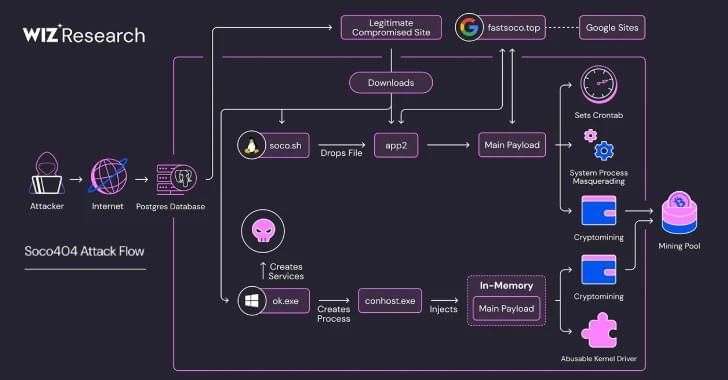Russian defense firms hit by cyberattacks using EAGLET malware via phishing lures; threat actors linked to Head Mare and Hive0156.



Threat hunters have disclosed two different malware campaigns that have targeted vulnerabilities and misconfigurations across cloud environments to deliver cryptocurrency miners.
The threat activity clusters have been codenamed Soco404 and Koske by cloud security firms Wiz and Aqua, respectively.
Soco404 “targets both Linux and Windows systems, deploying platform-specific malware,” Wiz researchers Maor Dokhanian, Shahar Dorfman, and Avigayil Mechtinger said. “They use process masquerading to disguise malicious activity as legitimate system processes.”

This FREE features Inspiration4 astronaut Chris Sembroski and educator Erin Duncan-Sembroski, along with your hosts, planetary scientist Dr. Kirby Runyon and space educator Dr. Mark Wagner. The high-energy one-hour session is focused on providing an overview of the three-day Earth and Space Experience coming up on November 7–9, 2025. Register now to learn about the geology at specific locations in Southern New Mexico, and how these sites are analogs for the Moon, Mars, and elsewhere in the solar system. Time is also allocated for a Q&A opportunity with all four speakers… come ready with questions! Participation in this also includes access to free space education resources that you can take back to share with your students or others in your community.
Note: This is appropriate for educators, industry professionals, and space enthusiasts from all walks of life. Space education is for everyone!
Chris “Hanks” Sembroski is a commercial astronaut, U.S. Air Force veteran, and passionate advocate for space exploration and STEM education. Best known for his role as Mission Specialist on the historic Inspiration4 mission in 2021, Sembroski spent three days in space, completing 47 orbits as part of the first all-civilian crew. With degrees in aeronautics and a career dedicated to advancing aerospace innovation, he has contributed to groundbreaking projects like Blue Origin’s New Glenn program and teaches as an adjunct faculty member at Embry-Riddle Aeronautical University. Chris’s journey reflects a lifelong passion for human spaceflight, from launching model rockets in college, leading teams through simulated missions at U.S. Space Camp, to advocating for space policy in Washington, D.C. He continues to inspire the next generation through his work as a speaker, educator, and industry leader, embodying the spirit of generosity and exploration.





Ancient bacteria that have evolved to become integral to our cells—converting nutrients from food into energy—may also contribute to neurologic disorders, such as spinal muscular atrophy (SMA) and autism, according to research in the lab of Yongchao Ma, Ph.D., from Ann & Robert H. Lurie Children’s Hospital of Chicago.
Called mitochondria, these mysterious parts of the cell have even retained their own DNA. Traditionally they are known as the “powerhouse of the cell.”
In recent years, however, mitochondria have been recognized as regulating many functions, including gene expression and how cells communicate. Dr. Ma’s research focuses on how dysregulation by mitochondria may lead to motor neuron degeneration in SMA or improper neuron connections in autism.

Using mathematical analysis of patterns of human and animal cell behavior, scientists say they have developed a computer program that mimics the behavior of such cells in any part of the body. Led by investigators at Indiana University, Johns Hopkins Medicine, the University of Maryland School of Medicine and Oregon Health & Science University, the new work was designed to advance ways of testing and predicting biological processes, drug responses and other cell dynamics before undertaking more costly experiments with live cells.
With further work on the program, the researchers say it could eventually serve as a “digital twin” for testing any drug’s effect on cancer or other conditions, gene environment interactions during brain development, or any number of dynamic cellular molecular processes in people where such studies are not possible.
The new study and examples of cell simulations are described online July 25 in the journal Cell.
